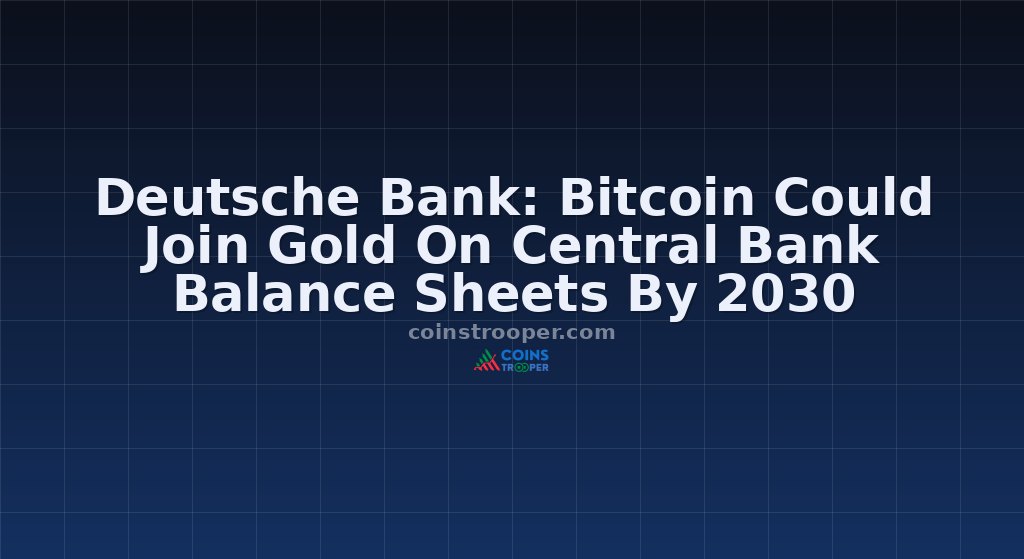Deutsche Bank: Bitcoin Could Join Gold On Central Bank Balance Sheets By 2030

- Deutsche Bank says Bitcoin could sit alongside gold on central bank balance sheets by 2030.
- Trump’s strategic Bitcoin reserve plan is fueling renewed debate around institutional adoption.
- Bitcoin’s low correlation to traditional assets strengthens its case as a long-term store of value.
- The prediction comes amid a sharp uptick in geopolitical and monetary shifts, with Bitcoin and gold both seeing renewed demand.
What Happened
“Bitcoin also has the potential to provide both an investment and a consumer-good value,” she wrote. “This explains why when equities rally strongly, their correlation to Bitcoin can rise.”
Market Context
The price of Bitcoin surged to over $124,000 last month before retreating, as traders digest U.S. monetary policy moves and brace for further volatility ahead of the 2026 election cycle.
Meanwhile, gold has surged to a record high above $3,700 per ounce, pushing its market cap past $25 trillion. Bitcoin’s market capitalization currently stands above $2.3 trillion.
He predicts that within months, most American banks will offer custody, trading, and deposit services for Bitcoin, calling U.S. regulation the “global benchmark” for institutional adoption.
Founded in 2018, Hex Trust provides crypto custody, trading, lending, and staking services to institutions across Asia, the Middle East, and Europe.
Why It Matters
Bitcoin may soon join gold as a reserve asset on central bank balance sheets, according to analysts at Deutsche Bank, as momentum builds behind efforts to reshape the global financial system.
Deutsche Bank says Bitcoin could sit alongside gold on central bank balance sheets by 2030.
A recent Federal Reserve research note highlighted that revaluing US gold holdings could increase their book value from $11 billion to $750 billion, a precedent that could be extended to crypto.
Details
Key Takeaways:
Trump’s strategic Bitcoin reserve plan is fueling renewed debate around institutional adoption.
Bitcoin’s low correlation to traditional assets strengthens its case as a long-term store of value.
The prediction comes amid a sharp uptick in geopolitical and monetary shifts, with Bitcoin and gold both seeing renewed demand.
Deutsche Bank: Trump’s Bitcoin Reserve Plan Rekindles Central Bank Adoption Debate
Marion Laboure, research analyst at Deutsche Bank’s Research Institute, said the Trump administration’s decision to create a US strategic Bitcoin reserve earlier this year “reignites the argument for central banks to hold Bitcoin as a reserve asset.”
In a note seen by CNBC, she added: “We conclude there is room for both gold and Bitcoin to coexist on central bank balance sheets by 2030.”
The Trump administration’s March executive order calling for the establishment of a Bitcoin reserve marked a major policy shift.
While details remain limited, US Treasury Secretary Scott Bessent said the government is committed to “budget-neutral pathways” to build the reserve.
“The Bitcoin that has been finally forfeited to the federal government is the foundation of the strategic Bitcoin reserve,” Bessent said.
The idea of adding Bitcoin to central bank reserves mirrors past strategies involving gold.
Laboure noted that Bitcoin’s low correlation with traditional assets gives it similar store-of-value characteristics as gold, making it appealing to institutions.
Hex Trust CEO: US Banks Will Soon Offer Bitcoin Services
Hex Trust CEO Alessio Quaglini believes US banks are on the verge of mainstreaming Bitcoin, pending regulatory clarity.
With over 200 employees and a million end users via B2B deals, the firm is targeting $20 million in revenue by 2025 and considering a future IPO.
Quaglini also sees stablecoins as a disruptive force, potentially replacing the SWIFT system for cross-border payments.

